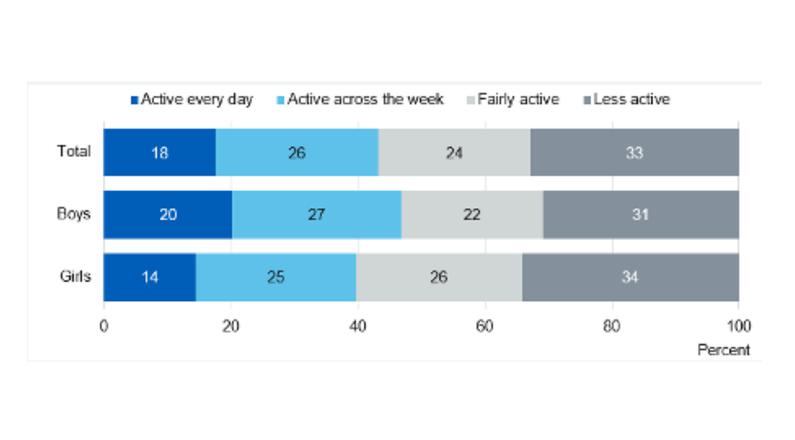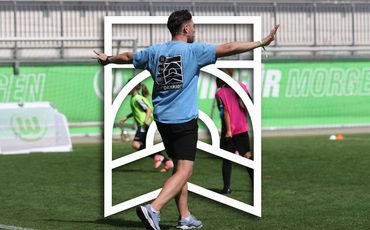
Exercise deficit disorder: Part 1
with Dr. Mark Helme
Currently in the UK only 18% of children are undertaking the recommended 60 minutes of moderate to vigorous physical activity (MVPA) per day. This figure reduces in girls, compared to boys and with decreasing affluence, making the problem worse in poorer communities. Government statistics show 20% of year 6 children are obese and last year 671 under 16’s were admitted to hospital with obesity as a primary diagnosis (NHS UK Digital, 2020),. These statistics show that youth physical activity is a concern for society. Exercise deficit disorder (EDD) is considered a condition where participants are not undertaking the recommended 60 minutes or greater of MVPA (Faigenbaum and Myer, 2012). This has now become considered as a disordered state due to the adverse health outcomes for children who consistently fall below this minimum level of activity. Children who do not engage in sufficient physical activity, early in life are likely to develop adverse health conditions, such as increased body fat, and fail to develop the required motor skills to engage in lifelong physical activity (Faigenbaum and Myer, 2012). The outcomes here suggest that 671 children admitted to hospital would grow exponentially as this generation ages.

Figure 1: Summary of children’s physical activity in the UK, NHS UK Digital (2020)
The concerns surrounding youth obesity and physical activity are not a new, yet the data does not suggest that outcomes are improving. This is shown by the number children admitted to hospital with obesity, rising for the last 10 years (2012/13 = 556, 2015/16 = 597). Information about the benefits of physical activity and healthy eating is easily available, yet the trend of decreasing activity and increasing obesity continues. This suggests current practices are not working and that novel and different approaches are required.
EDD suggests that not only are children are deficient in the physical activity required to prevent illness and maintain health, but also the prescribed exercise which promotes fundamental motor skills (FMS). The development of FMS allows children to participate, enjoy and potentially master many sports or past times, without which they may feel is not for them. This may be referred to as the proficiency barrier, meaning children disengage with sports, as they do not feel they have the competence to participate at an acceptable level.
This maybe shown better by comparing two case studies A and B.
Child A
walks to school and back everyday totalling 60 mins per day, each weekend day their parents go for a morning walk with the dog as a family. In this case study the child is meeting the MVPA guidelines and will probably not develop health concerns.
Child B
Plays several different sports during the week, at after schools clubs and weekend sports, these include swimming, rugby, cricket, and athletics.
In both cases the children are more than active enough to develop positive health. The differences lie in that child B has been exposed to a wide variety of different sports, skills and movements. Assuming they are coached well, this child will develop all the necessary FMS to feel confident to take on any new sport. This feeling of competence fosters a lifelong participation in sport and physical activity. Child A on the other hand has only walked, they have not had a rich experience and have not developed any transferable FMS that encourage them to participate in any future activities. In the case of child A, although in that moment they are avoiding the development of health concerns, they haven’t invested in the attributes that will sustain that into adulthood.
How can sports coaches and PE teachers help this? It is unlikely that children will be like child B, the evidence suggests that they are probably much less active. Therefore, it falls on the coach, or PE teacher, who may only be responsible for one hour of physical activity, to maximise that hour. They should invest in those skills that positively promote on going health and participation in sport through to adulthood. Recent research has shown that structured integrative neuromuscular training (INT), prescribed within a PE curriculum has shown significant benefits for children (Faigenbaum et al., 2011a). The development and application of INT will be discussed in part two.
References and resources
FAIGENBAUM, A. D., BEST, T. M., MACDONALD, J., MYER, G. D. & STRACCIOLINI, A. 2014. Top 10 Research Questions Related to Exercise Deficit Disorder (EDD) in Youth. Research Quarterly for Exercise & Sport, 85, 297-307.
FAIGENBAUM, A. D., FARRELL, A., FABIANO, M., RADLER, T., NACLERIO, F., RATAMESS, N. A., KANG, J. & MYER, G. D. 2011a. Effects of Integrative Neuromuscular Training on Fitness Performance in Children. Pediatric Exercise Science, 23, 573-584.
FAIGENBAUM, A. D., LLOYD, R. S., SHEEHAN, D. & MYER, G. D. 2013. The Role of the Pediatric Exercise Specialist in Treating Exercise Deficit Disorder in Youth. Strength and Conditioning Journal, 35, 34-41.
FAIGENBAUM, A. D. & MYER, G. D. 2012. Exercise Deficit Disorder in Youth: Play Now or Pay Later. Current Sports Medicine Reports (Lippincott Williams & Wilkins), 11, 196-200.
FAIGENBAUM, A. D., STRACCIOLINI, A. & MYER, G. D. 2011b. Exercise deficit disorder in youth: a hidden truth. Acta Paediatrica, 100, 1423-1425.
MYER, G. D., FAIGENBAUM, A. D., STRACCIOLINI, A., HEWETT, T. E., MICHELI, L. J. & BEST, T. M. 2013. Exercise Deficit Disorder in Youth: A Paradigm Shift toward Disease Prevention and Comprehensive Care. Current Sports Medicine Reports, 12, 248-255.
NHS UK Digital (2020), Statistics on Obesity, Physical Activity and Diet, England, 2020 [Online] England, NHS England. Available from < https://digital.nhs.uk/data-and-information/publications/statistical/statistics-on-obesity-physical-activity-and-diet/england-2020
>[Accessed 09/9/2020]
WALKER, G., STRACCIOLINI, A., FAIGENBAUM, A. D. & MYER, G. D. 2018. Physical Inactivity in Youth: Can Exercise Deficit Disorder Alter the Way We View Preventative Care? ACSM's Health & Fitness Journal, 22, 42-46.
Contributor:

Dr. Mark Helme
Mark is a Lecturer in Sport Coaching at Leeds Beckett University. His background is predominately in the areas of Strength and Conditioning. He has been active as an accredited practitioner, with the UKSCA, since 2007. Having worked with athletes from a range of sports and all age ranges, he has brought this experience to both his research and teaching activities. Mark’s doctoral research was exploring the implications of strength asymmetries on the sprint performances and injury rates of Rugby League players. As part of this research activity, he has also published biomechanical analysis of single leg strength training exercises. Mark’s current research interests are to further explore the transfer of single leg strength to sporting performance task, such as sprinting and changing direction. He will also be undertaking projects that explore how to create new pedagogical approaches to implementing resistance training in pre-adolescent children.
Comments
Related Pages


